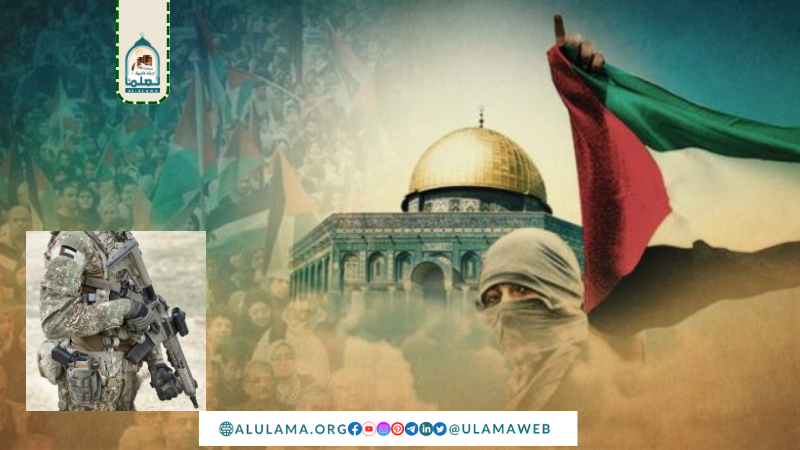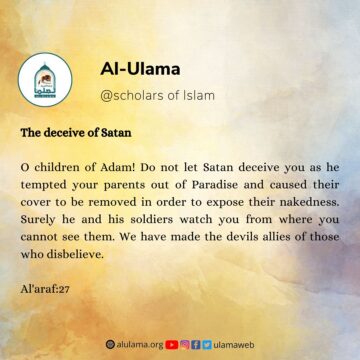A reputable scholar, whether from the past or the present, is never known to criticize Muslims during a time of war with an infidel enemy, regardless of the reasons for the outbreak of the war or the extent of the innovation or deviation among them. This is because the occasion calls for supporting, strengthening, and repelling the enemy, which is a duty during such times.
When a ruler in Syria launched an attack against the Muslim Brotherhood, accusing them of attempting to overthrow the government, Sheikh Ibn Baz sent a message inviting Muslims to support and assist them, rather than criticizing the Muslim Brotherhood for stirring up this ruler or planning his removal while they were in a weakened position and he was in a strong one. He did not engage in critiquing their ideological approach because the context called for supporting Muslims against the aggressor.
When the enemy is an infidel invader occupying Muslim lands, violating their sanctities, plundering their wealth, and violating their rights, it is the duty of every rational person to engage in defense and struggle. Allah has mentioned the treachery and betrayal of such enemies in His book. Therefore, there should be no doubt in the obligation for the discourse during war to be about supporting and assisting the Muslims. This must be reinforced with weaponry, financial aid, and assistance.
One should not criticize the Muslims in this situation, only three type of people will criticize:
those who are ignorant, those who are foolish without any understanding, and those who are mercenaries seeking to please their masters. General critique concerning the causes of the war, its preparation, or its provisions is permissible only in times of peace, not during war.
Moreover, speaking during times of conflict and war is far more significant than the impact of the sword – it can either invigorate or discourage. In terms of religious rulings, one should comment on what is established, not on what is assumed or imagined, contrary to the practices of some preachers who delve into political analyses and build religious rulings upon them, disregarding the actual, observable situation.
They forsake the duty of the moment and the verifiable reality, focusing on theoretical discussions related to potential, speculative future obligations.
Moreover, critiquing groups should not be likened to critiquing governments. Hamas, for example, holds authority in Gaza, and it has the legitimate prerogatives that come with it, including commanding and prohibiting. Therefore, directing critique at it can be equated to critiquing Islamic governments in Muslim countries. It is worth noting that critiquing the oppressed, who are being subjected to aggression and violation, and leaving the critique of the oppressor, who is obligated by Allah to defend them, is a form of dual standards and appeasement.
The issue of Palestine is not like any other matter for Muslims. It includes the Al-Aqsa Mosque, the place where the Prophet Muhammad ﷺ go to isra and miraj . The purification of Al-Aqsa Mosque from the defilement of the Jews is among the most significant obligations and one of the most obligatory acts of jihad. The extent of Salah al-Din al-Ayyubi’s respect among Muslims is such that he performed it to purify Al-Aqsa Mosque from the hands of the Christian occupiers. His action in this regard is celebrated among Muslims as one of his most praiseworthy deeds.
Sheikh Ibn Baz was asked: “What should a Muslim do regarding the Muslim fighters in Syria now?” [During the Hama events in 1982]
He answered: “What we know about their situation is that they are oppressed and deserve help and support. The government is killing them mercilessly, and they have called for Islamic rule, not anything else. The state is a non-Muslim, al aliwiya, Nusayri, esoteric infidel state.
It is obligatory to aid them [muslim], as they are the ones who called for Islamic rule, not anything else. It is obligatory for us to support and assist them until they save their country from the hands of their infidel, godless enemy, who shows no mercy to Muslims and spares no cruelty against them.
To the exclusion of all, let us disregard the talk of scholars, and abandon the talk of the ignorant, the foolish, and the mercenaries.”
May Allah grant victory to the people of Gaza, strengthen them against their enemies, frustrate their plots, defeat their armies, reveal their evil intentions, and occupy them with their own concerns.
(Written by Sheikh Faisal bin Qazzaz Al-Jasim, one of the students of Sheikh Abdulaziz bin Baz, Ibn Uthaymeen, and other prominent scholars.)















